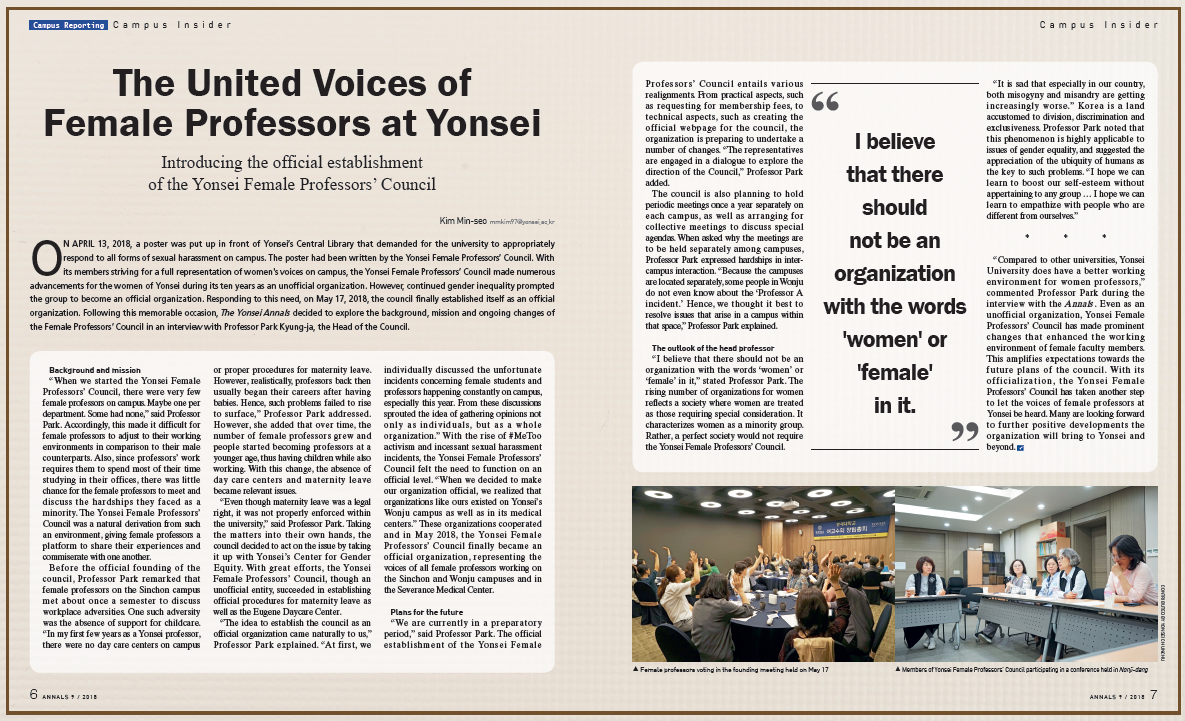Introducing the official establishment of the Yonsei Female Professors’ Council

ON APRIL 13, 2018, a poster was put up in front of Yonsei’s central library that demanded for the university to appropriately respond to all forms of sexual harassment on campus. The poster had been written by the Yonsei Female Professors’ Council. With its members striving for a full representation of female’s voices on campus, the Yonsei Female Professors’ Council made numerous advancements for the women of Yonsei during its ten years as an unofficial organization. However, continued gender inequality prompted the group to become an official organization. Responding to this need, on May 17, 2018, the council finally established itself as an official organization. Following this memorable occasion, The Yonsei Annals decided to explore the background, mission and ongoing changes of the Female Professors’ Council in an interview with Park Kyung-ja, the Head Professor of the Council.
“When we started the Yonsei Female Professors’ Council, there were very few female professors on campus. Maybe one per department. Some had none,” said Professor Park. Accordingly, this made it difficult for female professors to adjust to their working environments in comparison to their male counterparts. Also, since professors’ work requires them to spend most of their time studying in their offices, there was little chance for the female professors to meet and discuss the hardships they faced as a minority. The Yonsei Female Professors’ Council was a natural derivation from such an environment, giving female professors a platform to share their experiences and commiserate with one another.
Before the official founding of the council, Professor Park remarked that female professors on the Sinchon campus met about once a semester to discuss workplace adversities. One such adversity was the absence of support for childcare. “In my first few years as a Yonsei professor, there were no daycare centers on campus or proper procedures for maternity leave. However, realistically, professors back then usually began their careers after having babies. Hence, such problems failed to rise to surface,” Professor Park addressed. However, she added that over time, the number of female professors grew and people started becoming professors at a younger age, thus having children while also working. With this change, the absence of day care centers and maternity leave became relevant issues.
“Even though maternity leave was a legal right, it was not properly enforced within the university,” said Professor Park. Taking the matters into its own hands, the council decided to act on the issue by taking it up with Yonsei’s Center for Gender Equity. With great efforts, the Yonsei Female Professors’ Council, though an unofficial entity, succeeded in establishing official procedures for maternity leave as well as the Eugene daycare center.
“The idea to establish the council as an official organization came naturally to us,” Professor Park explained. “At first, we individually discussed the unfortunate incidents concerning female students and professors happening constantly on campus, especially this year. From these discussions sprouted the idea of gathering opinions not only as individuals, but as a whole organization.” With the rise of #MeToo activism and incessant sexual harassment incidents, the Yonsei Female Professors’ Council felt the need to function on an official level. “When we decided to make our organization official, we realized that organizations like ours existed on Yonsei’s Wonju campus as well as in its medical centers.” These organizations cooperated and in May 2018, the Yonsei Female Professors’ Council finally became an official organization, representing the voices of all female professors working on the Sinchon and Wonju campuses and in the Severance Medical Center.
Plans for the future
“We are currently in a preparatory period,” said Professor Park. The official establishment of the Yonsei Female Professors’ Council entails various realignments. From practical aspects, such as requesting for membership fees, to technical aspects, such as creating the official webpage for the council, the organization is preparing to undertake a number of changes. “The representatives are engaged in a dialogue to explore the direction of the Council,” Professor Park added.
The council is also planning to hold periodic meetings once a year separately on each campus, as well as arranging for collective meetings to discuss special agendas. When asked why the meetings are to be held separately among campuses, Professor Park expressed hardships in inter-campus interaction. “Because the campuses are located separately, some people in Wonju do not even know about the ‘Professor A incident.’ Hence, we thought it best to resolve issues that arise in a campus within that space,” Professor Park explained.
The outlook of the head professor
“I believe that there should not be an organization with the words ‘women’ or ‘female’ in it,” stated Professor Park. The rising number of organizations for women reflects a society where women are treated as those requiring special consideration. It characterizes women as a minority group. Rather, a perfect society would not require the Yonsei Female Professors’ Council.
“It is sad that especially in our country, both misogyny and misandry are getting increasingly worse.” Korea is a land accustomed to division, discrimination and exclusiveness. Professor Park noted that this phenomenon is highly applicable to issues of gender equality, and suggested the appreciation of the ubiquity of humans as the key to such problems. “I hope we can learn to boost our self-esteem without appertaining to any group … I hope we can learn to empathize with people who are different from ourselves.”
* * *
“Compared to other universities, Yonsei University does have a better working environment for women professors,” commented Professor Park during the interview with the Annals. Even as an unofficial organization, Yonsei Female Professors’ Council made prominent changes that enhanced the working environment of female faculty members. This amplifies expectations towards the future plans of the council. With its officialization, the Yonsei Female Professors’ Council has taken another step to let the voices of female professors at Yonsei be heard. Many are looking forward to further positive developments the organization will bring to Yonsei and beyond.
Kim Min-seo
mmkim97@yonsei.ac.kr

